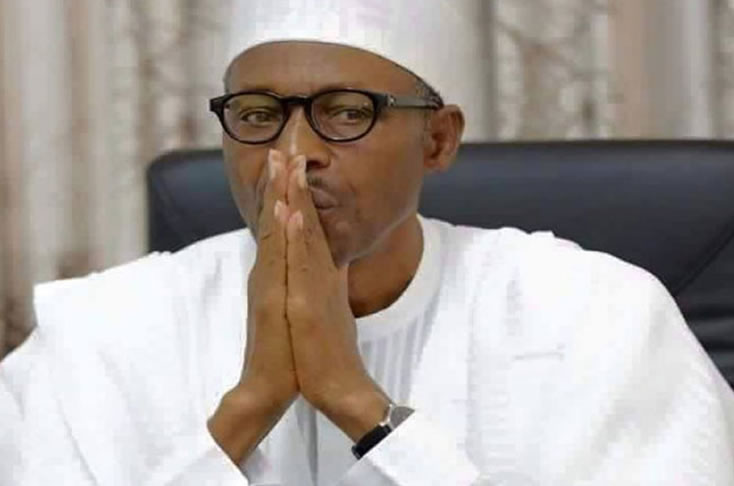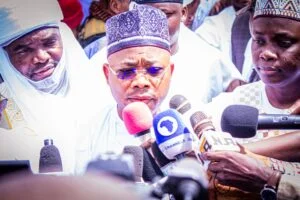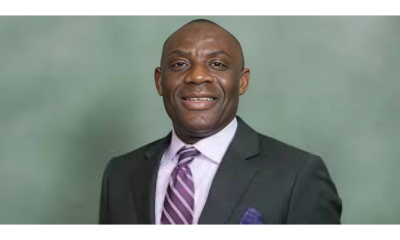EDITORIAL
Agenda for President Muhammadu Buhari

History will be made in Africa’s most populous nation, and the country with the continent’s largest economy today when President Muhammadu Buhari is sworn in as the 16th President of the Federal Republic of Nigeria. Buhari is on course to equaling the record of former Nigerian leader, Chief Olusegun Obasanjo, who served as a military head of state, and was sworn in the second time as civilian leader of the country.
For Nigerians as a whole, they will have much to celebrate as the inauguration, and that of the National Assembly in a couple of days will mark 20 years of interrupted democracy in the continent’ most populous nation.
Nigerians eager to effect a change from the increasing security threat posed by Boko Haram Insurgency, corruption in high places voted for a change of governance in 2015.Almost at the same venue where he will be inaugurated four years ago, at the Eagle Square in Abuja, President Buhari’s coming to power marked the first time an opposition party would prevail over a ruling party in Nigeria promised the nation three key areas that will form the cornerstone of his administration: security, especially in tackling insurgency; economy and tackling one of the nation’s most dreaded vices: corruption. After four years of his administration, and towards the expiration of his first tenure, Nigeria’s went to the polls on February 27 in what later turned out to be one of the most hotly contested and disputed elections in the history of the country.
Nigerians voters were divided over renewing Buhari’s mandate, or to opt for his main challenger, Alhaji Atiku Abubakar. The perceived poor leadership style of Buhari cost him significant number of voters, even in his traditional stronghold of the North West, North East and South West where his main challenger, Atiku Abubakar made incursions. His critics, especially the opposition took the APC-led administration to task, of doing little even in the key areas of their promises to the nation.
The PDP in particular maintained that the security situation has deteriorated under the present administration with herders-farmers’ crises, especially in the food chain of the country which consists of states like Benue, Taraba, Adamaw, Kogi, Adamawa ravaged by Fulani herders who always, armed with sophisticated weapons, killing and maiming hapless farmers. The crises left thousands of Nigerians killed, while crops and animals worth billions of Naira were destroyed.
They also pointed out that because of the government’s poor economic management 87, million Nigerians have been rendered extremely poor, and today Nigeria has infamously assumed the status of the poverty capital of the world, displaying India which has a population of more than one billion, compared to Nigeria’s mere 150 million.
His government was criticized for not doing much on security especially in the wake of growing rate of banditry in the north, kidnapping, robbery, etc.
All said and done, Buhari’s greatest challenge, especiall as he mounts the saddle of leadership for his second term in office is the economy whose picture does not look promising enough. Even the Central Bank warned not long ago that the nation’s economy risks going into recession.
Undoubtedly, Buhari inherited one of Africa’s most buoyant economies in 2015 before it slid into recession shortly after, recording negative growth and stagnation for more than one year. Nevertheless, it is to the credit of his administration that the country was steered out of recession.
However, Nigeria, one of the world’s most promising economies had struggled with trepid growth under Buahari. It a sad commentary that unemployment rate has more than doubled while more people have been driven into extreme poverty, especially in his tenure.
But to the government’s credit, it has done a lot in food production, especially with the introduction of Anchor Borrower’s scheme of the Central Bank of Nigeria. As a result, Nigeria is making great progress in food production especially in the production of rice, beans, maize millet, sorghum, tomatoes, etc.
There has also been remarkable progress in power generation, electricity supply and other core areas of development like railways and road construction.
DAILY ASSET expects the government to sustain these initiatives, especially the programme to ensure food self –sufficiency for the nation in the next few years. There are also high expectations in some quarters that the economy will be brought back on track in the next few years, especially with the efforts being made to win investors’ confidence with improvement in the ease of doing business climate.
It is noteworthy that investors in particular remain keen on backing the government ‘s Economic Recovery and Growth Plan[ERGP], an improved business climate. Experts have maintained that Buhari needs to carry out reforms in the exchange rate mechanism, improve budgetary implementation to propel the economy to grow to expectations.
However, one of the greatest problems facing the new administration, and why most Nigerians are skeptical of President Buhari achieving is his failure to show broad-mindedness ,accommodation, and statesmanship especially in his appointments and conduct of state affairs generally.
While his key appointments including those in charge of defence and strategic establishments are skewed in favour of the far North and a particular religion, and ostracizing other Nigerians from outside his enclave, he is aggravating his narrow prism in the conduct of state matters to his Fulani ethnic stock.
President Buhari has unfortunately degenerated into a leader, who defines Nigeria by serving and promoting the Fulani interests above every other interest.
A few weeks back, the Meyetti Allah which he was a patron was in the front burner of allegations of plans by the Buhari-led government to pay them billions of Naira to enable their members maintain the security of the nation, especially that of the North.
The idea to put it mildly was in a bad taste, and against the collective interest of the nation and underscores how the President can wittingly or unwittingly sacrifice the national interest, including the nation’s security for his parochial interest. With the controversy of the plan to make billions of Naira of tax payers’ money available to his ethnic group, who are seen more as militia behind the herders’ atrocities , especially in the Middle Belt Region of the country, came the controversial Fulani Radio Station, to be established and funded by the Federal Government. This to DAILY ASSET is ludicrous and unacceptable and condemnable,
Even if Buhari wants to improve the of of his people, he should do so within the structures and constitutional framework. Never in the history of governance of this nation, has a leader so identified with his people and even religion without regard to others’ feelings, interest and sensibilities than has Buhari done and continues to do for his tribesmen.
For those who had reservations because of his low performance in his first tenure, his Fulanisation of his government, apologies to Chief Obasanjo, will see more Nigerians losing faith in his administration to make this nation a better place for all Nigerians in his second tenure.
Buhari still has more time to retrace his step and go the path of his predecessors who served this country with sense of patriotism and purpose or go down as one that came only came to serve and promote his ethnic group alone, rather than the entire nation that gave him their collective mandate.
EDITORIAL
Need to Urgently Redeem the Image of Nigeria’s Judiciary

The symbol of a blindfolded lady with a scale in one hand and a knife in the other depicts the balance and fairness the judiciary should represent in the society.This iconic symbol is meant to convey that justice should be administered without fear or favour, and that the law is applied equally to all and sundry, no matter whose ox is goored.
The blindfold signifies impartiality – that justice is blind to external influences, biases, or prejudices. It emphasizes Objectivity – that justice should be based solely on the facts and evidence presented before the court of law.The blindfold also represents fairness – that justice is fair and equal for all, regardless of social status, wealth, or other societal factors.It is the totality of all of these that the judiciary is aptly described as ‘the hope of a common man.’ However, there are discordant definitions of justice, being dished out by judicial officers in Nigeria today.Allegations of bribery, fraud, undue adjournments and delay of cases, favouritism in appointments and promotion of judicial officers, conflicting judgements of courts of coordinate jurisdiction or judgements that are at variance with earlier precedence, et al.One worrisome judicial spectacle is the conflicting judgements, especially from political cases before the courts. All of these have severely dented the image of Nigeria’s judiciary. Consequently, keen watchers make unsavoury remarks that justice has become a precious gift to only the ‘highest bidder,’ while others castigate certain judicial pronouncements as ‘jankara judgements.’ This should not be the case. A large dose and over-reliance on ‘technicalities’ by the courts rather than objectivity and substance of the case is another sore thump of the judiciary. Arguments bordering on technicalities in a case are sometimes escalated up to the apex court, thereby unduly delaying the hearing of the substantive case before the court.The appointment and promotion of judicial officers is another clog militating against transparency of justice delivery.Sections 231(3) of the Constitution of the Federal Republic of Nigeria (as amended) states; ‘A person shall not be qualified to hold the office of Chief Justice of the Supreme Court , unless he is qualified to practice as a legal practitioner in Nigeria and has been so qualified for a period of not less than fifteen years.’In same way, Sections 238(3), 239(3), 250(3) et al, states that a qualified legal practitioner with not less than twelve years and ten years are respectively qualified to be a Chief Judge of the Court of Appeal and Federal High Court, while ten years minimum qualification is stipulated for qualified legal practitioners to occupy the seat of the State High Court and the National Industrial Court in the other Sections that follow.The intent of the Constitution is that any qualified and competent legal practitioner from either the bench or the bar can be appointed as a judge in any court, including the Supreme Court. It is also the intent of the Constitution that the promotion of judicial officers to a higher court must not be sorely based on seniority in service. To reverse this, there have been pressures for appointment of qualified senior lawyers from the bar as Supreme Court judges and Court of Appeal to invigorate the judiciary to no avail. Thus, the old culture of ‘wait for your turn’ in the promotion of judicial officers whose thinking and actions are conditioned to the old order has continued to gain currency.DAILY ASSET urges the judiciary to immediately return to the constitutional provision as enshrined in Sections 231(3), 238(3), 250(3) et al, of the 1999 Constitution of the Federal Republic of Nigeria (as amended) to appoint qualified legal practitioners through a competitive process in order to inject a new dose of adjudication for the betterment of justice delivery. This will go a long way in rekindling and orientating the negative image of the judiciary in the country.Judges who will mount the saddle through this competitive process will be adequately armed with a new orientation that will usher in speedy dispensation of justice. It will also mark a departure from the ‘wait for your turn’ syndrome of promoting judicial officers on the bench based on seniority in service.The judiciary must do a critical introspection and reform both criminal and civil justice administration by timely attendance to cases in keeping to the axiom of ‘justice delayed is justice denied.’This is the sure way for the judiciary to redeem it’s badly battered image and restore hope and confidence by the public. ReplyForwardAdd reactionEDITORIAL
A Word Against Women Underrepresentation in Nigerian Politics

Women underrepresentation and marginalization in Nigeria’s political and democratic governance may not be reversed soon judging from the male chauvinism and non-adherence to the Beijing declaration more than two decades ago.Women comprise about 49.32 % of Nigeria’s population, yet they are relegated to the background politically, economically and in governance.
Historically, politics has been a male-dominated occupation but many countries in the world have long before now started encouraging women to actively participate in politics. Improving women’s political participation and representation should be prioritized by the political elite, currently dominated by men folk in Nigeria.Section 40 of the 1999 Constitution of Nigeria (as amended), guarantees the right to free assembly and association, including forming or joining political parties. However, women remain grossly underrepresented. The Beijing Declaration at the Fourth World Conference on Women in 1995, stipulates that 35% of political positions be reserved for women; unfortunately, this provision has been jettioned in Nigeria by the male-dominated political class. Efforts by various groups to enforce this 35% affirmative action have met a brick wall.In March 2022, the National Assembly rejected a bill requiring affirmative action for women in political party administration and specific legislative seats. Again, another bill proposing special seats for women in the national and state assemblies was also defeated.Factors such as religion, cultural norms, nepotism, socioeconomic barriers, political violence, illiteracy among women, and contradictory government policies impede women’s political representation. These issues hinder the full realization of 35% affirmative action in the country’s political space. Proponents of women participation in politics have continued to urge the government to demonstrate more commitment to women representation and participation in politics by endorsing, adapting and domesticating international and regional human rights instruments. Promoting affirmative action to build a critical mass of women in leadership roles and reviewing practices that marginalize women should henceforth be a priority in the nation’s political engineering.Those who belong to the school of thought that lowering the bar for women to participate in politics is counterproductive must have a rethink and pause to critically look at countries which have reserved at least 35% political representation and participation for women. Such countries are making tremendous progress in socio-political development.For instance, Rwanda sits atop Africa’s continent, nay the world, with a female majority in the National Assembly with 63.75% in House of Representatives and 53.75% in the Senate. Also, a number of countries whose presidents and or vice presidents are women no doubt, are making steady progress in all indices of development.The highest number of women ever elected into the National Assembly is thirty-six in 2007 with twenty-seven in the House of Representatives and nine in the Senate. Since then, there has been a steady decline to thirty-two in 2011, twenty-two in 2015 and eleven in 2019. It further declined to a paltry four women out of the 109 seats in the Senate in 2023, representing a meagre 2.7%, in spite of strategies to improve women’s political representation in Nigeria.The history of any nation cannot be complete without equitable contribution of women, which mostly go uncelebrated. Women play significant roles in our homes, offices and businesses and provide support systems leading to stability, productivity and profitability.However, governments at all levels through their policies, programmes, budgeting and service delivery processes over the years have failed to address the structural and social disadvantages that inhibit gender mainstreaming. This has placed women greatly at a disadvantage, leading to their exclusion.The private sector is not also left out from the marginalization of women. They have mostly remained reluctant to respond to deep disadvantages that cripple women eligibility to access funding, mainly in the areas of collateral and interest rates. Special consideration must be given to women, because with greater gender equality or rather equity in both public and private sectors, the benefits would be far-reaching especially in reducing poverty among other socio-economic gains. Globally, governments and gender advocates have over the years come up with resolutions to accelerate gender inclusion.Platforms like the Conference on Women, 1975, which was the first international conference held by the United Nations to focus solely on women’s issues, marked a turning point in policy directives. Another major significant step as earlier mentioned was the Beijing Conference in China that provided the framework to extend the frontiers for gender mainstreaming. Since then significant but sometimes inconsistent progress has been made in advancing gender inclusion. Many countries have continued to enact laws and formulate policies, but implementation remains the challenge.For instance, as with other critical sectors of the Nigerian economy, the enormous economic role played by women in the agricultural sector has remained barely supported and undervalued. In contrast to their male counterparts in agriculture, female participants in the sector have relatively narrow access to funding, inputs, training, extension services, land, technology, markets and decision making opportunities.Available reports have shown that female participants in the agriculture sector represent only 8% of landowners, access only 10% of available credit and 5% of extension services. This has restricted a large number of women at the level of subsistence farming, with the men dominating the commercial and lucrative aspect – largely exacerbating gender inequalities.Similarly, in politics women representation in terms of elective and appointive positions still leaves much to be desired.DAILY ASSET is of the opinion that the number of female ministers, commissioners and legislators at federal and state levels should be increased by a law duly passed by parliaments at national and sub-national levels and duly accented to by appropriate authorities. Through the acts of parliament, plans, policies, budget and service delivery become more gender sensitive to promote inclusion.Nigeria cannot make progress when half of the population is excluded from decision-making. Policy makers must keep to the axiom, ‘when you empower a woman you empower a nation.’EDITORIAL
Deploy Technology and Intelligence to Fight Insecurity

The growing insecurity in Nigeria – banditry, kidnappings, terrorism and other violent crimes, can rightly be described ‘a national calamity’ that requires the use of technology and intelligence to combat.Realising this, Plateau, a North Central state, grappling with worse security challenges, has announced its partnership with Biench UAS Limited to acquire military-grade drones for surveillance, intelligence gathering and rapid response by security agencies.
At the recent unveiling of Briech UAS-manufactured drones and missiles in Kuje, the Federal Capital Territory (FCT), Abuja, Governor Caleb Mutfwang, alongside the Chief of Defence Staff, General Christopher Musa, emphasized the critical role of technology in modern security operations. They noted that the partnership represents a fresh and innovative approach to tackling security threats in the State and the nation at large.Mutfwang, commended the Nigerian Armed Forces for their dedication to national security. He called on the Nigerian military to encourage local manufacturers in producing military-grade surveillance equipment tailored towards tackling the nation’s unique security challenges.He further highlighted the impact of the partnership, noting that the deployment of Briech UAS facilities in Plateau State has already enhanced the efficiency of security forces on the ground and expressed optimism that the collaboration would further strengthen security operations, ultimately restoring peace and enabling farmers to return safely to their fields.“The time is now to address these challenges that hinder national prosperity. One of my key aspirations for this year is to see Plateau State farmers return to their farms. The only way to achieve this is by providing them with adequate security coverage, both in the air and on the ground, ensuring their safety”, the governor stated.Nigeria’s Chief of Defence Staff, General Christopher Musa, lauded the innovation and initiative and assured that the Defence Headquarters would explore collaborative opportunities with the company to enhance national security efforts.“It is with great honour and appreciation that I witnessed the unveiling and live demonstration of the first set of locally manufactured attack drones by Briech UAS Limited. This marks a significant milestone in our nation’s journey toward self-reliance in defense technology and a major step in strengthening our security capabilities.”If properly utilized, the acquisition of cutting-edge surveillance technology and intelligence would significantly boost the capacity of security personnel to decisively combat criminal elements that are operating with different cells across the country.In fact, those technological advancements could contribute to securing victory over forces that have long destabilized the nation.Additionally, the cutting-edge technologies would provide critical intelligence to enable security forces to take swift and decisive actions against emerging threats.Moreover, in an era of increasingly complex security challenges, the adoption of advanced surveillance technology is pivotal to achieving optimal operational outcomes.The significance of the latest advancements in unmanned aerial vehicle (UAV) technology is a landmark achievement in the nation’s pursuit of enhanced security solutions hence the UAVs are equipped with advanced sensors and imaging technologies to enable them to detect and monitor activities that pose threats to national security.It is embarrassing, shameful and a monumental failure on the part of security agencies who for over two decades have been fighting insurgents, bandits, terrorists, arsonists and kidnappers without much success.In some instances, victims who fall prey to the criminals are brutally murdered while others are held in captivity under inhuman conditions for more than six months. Yet the criminals engage in telephone communication with security agencies and families of the victims without a clear cut way to track and attack them and rescue the innocent victims. This is an indictment on our security agencies.Recall when an American was kidnapped in a boarder town in Niger, a few years ago and trafficked across to Nigeria, the American seals, through the use of technology, tracked and promptly rescued one of their own in less than 24 hours.The Federal Government had acquired and equipped the Nigeria Air force with over 70 combat aircrafts in the last decade. Similarly, the combat equipment of the Nigeria Army, Nigeria Navy, Nigeria Police and other paramilitary forces have been enhanced, yet non-state actors are daily devising new criminal methods of perpetuating insecurity rather than the security agencies caging them.DAILY ASSET urges the Nigerian security agencies to immediately start deploying emerging technologies as well as strengthen intelligence gathering to make the country safe just as the security agencies of advanced nations deploy technology to check criminal activities of non-state actors.We commend the local assembly and manufacturing of military-grade surveillance drones and missiles as a step in the right direction that should be tailored to the nation’s unique security challenges.



























